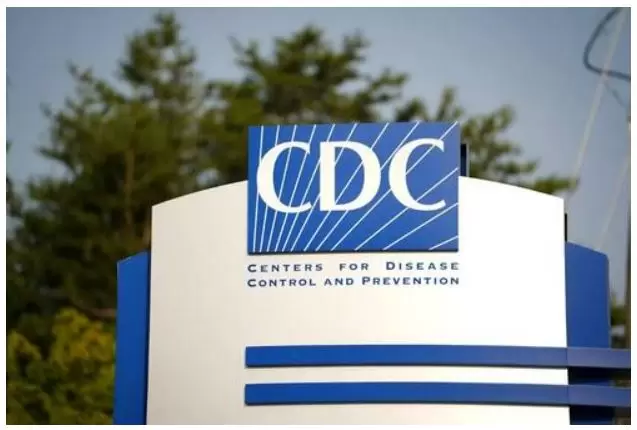Authored by Zachary Stieber via The Epoch Times (emphasis ours),
The U.S. Centers for Disease Control and Prevention (CDC) hid how a woman who suffered chest pain and other symptoms following COVID-19 vaccination received a shot because of a mandate at work, newly obtained documents show.
The agency also redacted how multiple children were diagnosed with Kawasaki Disease after receiving a COVID-19 vaccine, according to the documents.
The Epoch Times obtained more than 1,400 pages of emails from the CDC concerning its Clinical Immunization Safety Assessment (CISA) project, which analyzes post-vaccination problems reported by health care providers. The tranche included numerous redactions.
While redactions are allowed under the Freedom of Information Act, there were signs that too much information was being hidden.
The Epoch Times appealed some of the redactions.
The CDC agreed to remove some of them, revealing what the agency initially shielded.
In one email, a provider reports a 30-year-old woman who suffered chest pain and leg twitching following COVID-19 vaccination. The original copy of the email stated in part that she “got vaccine due to [redacted].”
In the updated copy, the CDC removed the redaction, showing that the woman received a vaccine because of a mandate at work.
Several other portions of the emails that are now unredacted show the CDC hid how multiple children, including a 2-year-old, were said to have suffered from a serious inflammatory illness called Kawasaki Disease shortly after receiving a shot.
One girl suffered inflammation around the eyes, swollen lips, high fever, and a rash, and “was admitted last week with Kawasaki,” one of the girl’s parents wrote on Dec. 5, 2021, the new documents show. She received a dose of the Pfizer-BioNTech vaccine two weeks prior.
Dr. Matthew Oster is a cardiologist who works for the CDC.
“The biggest question, of course, here, is whether this was truly [redacted] or whether this was [redacted] related to the vaccine,” Dr. Oster wrote after hearing about the case.
The cleaner copy of the email showed that the redactions covered “KD,” or Kawasaki Disease, and “MIS-C,” or multisystem inflammatory syndrome in children.
“We do now have a small number of cases like this one,” Dr. Oster said.
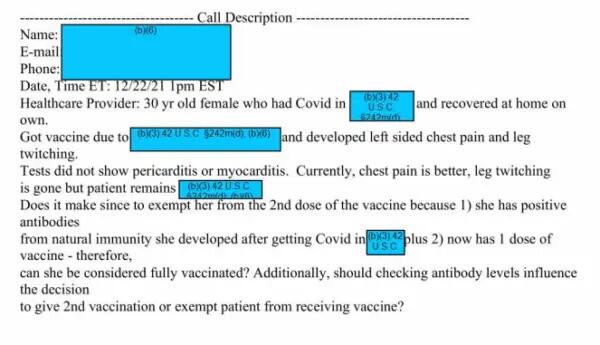
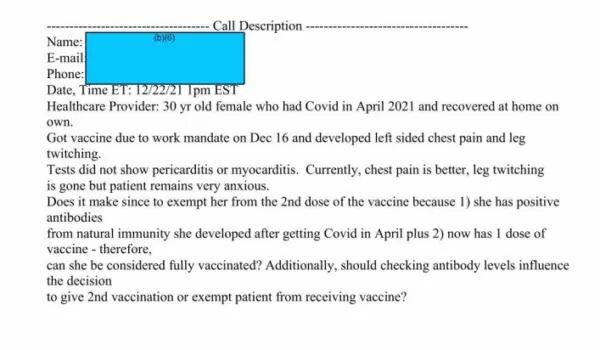
The CDC has portrayed MIS-C as only being caused by COVID-19, but studies have found that there were MIS-C cases before the COVID-19 pandemic and that some people suffered the syndrome after vaccination without evidence of COVID-19. The CDC says on its website that the agency is “investigating reports of multisystem inflammatory syndrome in children (MIS-C) associated with coronavirus disease 2019 (COVID-19), which may present with Kawasaki disease-like features.”
Another email originally hid the age of a male child and what his doctor suspected he suffered after receipt of a second dose of Moderna’s vaccine.
The boy was 2 years old, the newly obtained documents show, when he was admitted with what a pediatric infectious disease doctor suspected was “atypical Kawasaki Disease.” The documents show that the doctor also considered MIS-C as a diagnosis in light of how the boy’s sister tested positive for COVID-19 on the same day the boy started showing symptoms of fever, although multiple COVID-19 tests on the boy returned negative.
The doctor said he had a “low suspicion” for a COVID-19 vaccine reaction but still submitted a report to the Vaccine Adverse Event Reporting System (VAERS), which the CDC helps run.
Kawasaki Disease was detected as a safety signal for the Pfizer and Moderna vaccines among children aged 5 to 11 when the CDC first ran an analysis on VAERS data in 2022, according to files previously obtained by The Epoch Times. The analysis did not include children younger than 5. Kawasaki disease after COVID-19 vaccination has been reported in the literature, although a study on patients with a history of the disease who contracted COVID-19 or were vaccinated uncovered no signs of problems.
An internal CDC message, now fully unredacted, showed that an official described there being “another CISA ‘inquiry’ about a child with atypical Kawasaki Disease.” Another official said the reports were “very rare” while a third said the normal CDC processes were sufficient to monitor for the disease post-vaccination “unless there’s a specific ask or data need.”
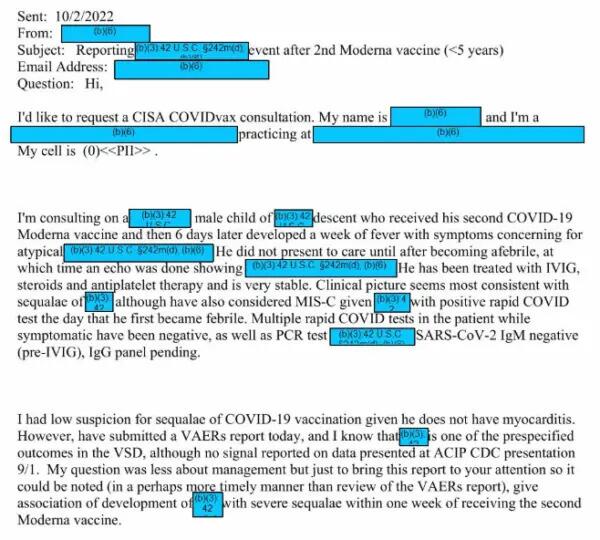
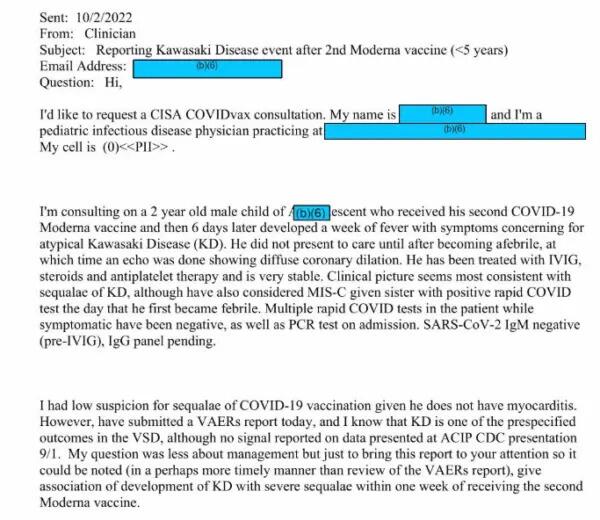
Other removed redactions show that:
- A person reporting symptoms after COVID-19 vaccination was reporting that the symptoms included Coxsackievirus and that he himself was the patient. The provider wrote, “I … don’t know whether to fear another vax more or less than the risk of infection.”
- A patient who was reported as suffering heart inflammation after a third Pfizer dose, and came back with the inflammation one year later, was 17 and a male.
- The CISA expert who said the woman who suffered chest pain could get additional vaccine doses was Dr. Oster. Previously disclosed emails showed the program repeatedly said people with post-vaccination symptoms should receive more doses.
- A patient with “intense malaise” and other symptoms about six months after a Pfizer shot had an elevated heart rate, per a portable electrocardiogram, and sinus tachycardia per a cardiology consultation.
Words and phrases that were redacted originally, but not any longer, include “your daughter”, “hospitalist”, “the parents”, “cardiac workup”, “a physician”, “I believe”, “patient was started on a course of Prednisone”, and “does not drink, smoke, or use any drugs.”
Every single email chain for which redactions were protested was returned with at least some redactions cleared.
The original version claimed that the redactions were appropriate under exceptions outlined in the Freedom of Information Act, including an exception that protects “personnel and medical files and similar files” if their disclosure “would constitute a clearly unwarranted invasion of personal privacy.”
A CDC official told The Epoch Times in an email that the agency, after receiving the appeal, conducted a “careful review” and removed some of the redactions. The official did not explain why the CDC wrongly redacted so much information.
The CDC “has provided modified records for the pages listed in your appeal,” an official with the U.S. Department of Health and Human Services, the CDC’s parent agency, told The Epoch Times in an email. Appeals of CDC Freedom of Information Act requests are lodged with the department.
Fits Pattern
Any person can request information through the Freedom of Infection Act (FOIA), and agencies across the government typically redact portions of responsive documents or withhold them entirely. Agencies “often use FOIA exemptions improperly, withholding records simply because they may reveal problems at the agency or just ‘paint the agency in a bad light,’” Melissa Wasser, a lawyer at the Project On Government Oversight, told senators in 2022. People “consistently receive large swaths of arbitrarily redacted information,” she added.
When presented with signs that information was improperly redacted or withheld, people primarily have two options: lodge an appeal or sue.
Both methods have worked to extract information from the CDC during the pandemic.
An Epoch Times appeal in another case, for example, returned a copy that removed significant redactions that were applied to an internal email describing what Pfizer and Moderna told them about studies that were being done regarding heart inflammation and COVID-19 vaccines.
The unredacted information showed that Moderna had not tested samples from vaccine recipients for subclinical myocarditis because it was waiting for a “specific cardiac biomarker [to] be identified.” An outside study from Switzerland later found signs of subclinical heart inflammation in about one out of 35 people.
The CDC acknowledged that the information had been wrongly redacted. It reasoned that the information “cannot be considered confidential” because it was shared before and “is readily available to the public,” although some of the details had never been made public previously.
Among other lawsuits, meanwhile, one led to the release by the CDC of answers from its V-safe surveillance survey while a second prompted the disclosure of what participants wrote in free-text fields after the CDC left off adverse events of special interest from the survey. Some of the data had never before been described publicly, while other information from the system had only been outlined in CDC-authored studies and presentations.



